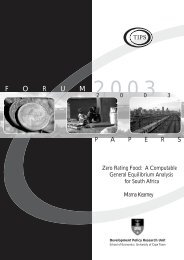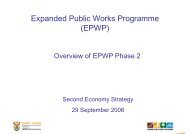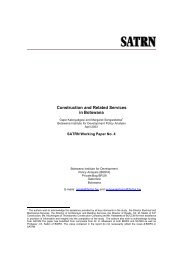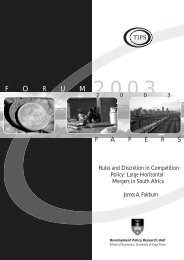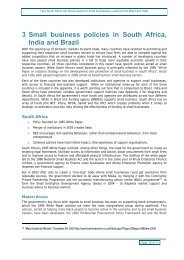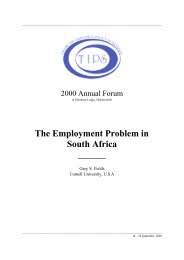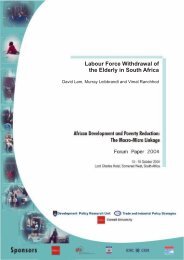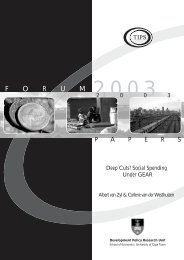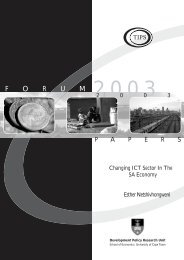Monitor Vol 39 08_Final_Nov08.pdf - tips
Monitor Vol 39 08_Final_Nov08.pdf - tips
Monitor Vol 39 08_Final_Nov08.pdf - tips
You also want an ePaper? Increase the reach of your titles
YUMPU automatically turns print PDFs into web optimized ePapers that Google loves.
Environmental policy<br />
64<br />
Trade & Industry <strong>Monitor</strong><br />
established in 1996. The ESDP closed down in 2002 and has in its place<br />
the DANIDA supported National Renewable Energy Strategy 18 .<br />
A major argument against RE in general and biofuel in particular is the<br />
large subsidies requirements. Subsidies conceal the commercial energy<br />
cost. This badly allocates scarce capital resulting to imbalanced competition<br />
between energy sources. Failure on the part of government to extend<br />
the subsidies enjoyed by the conventional energy to RE technology is also<br />
a hurdle that needs to be resolved. In addition, very few of the African<br />
countries have in place clear strategies and targets for RE development<br />
generally and specifically. The increase in biofuels utilisation and development<br />
in other continents over the past years is due to government policy<br />
decision. In North America, policies that help grain-based ethanol compete<br />
in the market were extended, and additional strategies to increase<br />
biodiesel utilisation are being considered. In 2002, German parliament<br />
decided to exempt all biofuels from gasoline tax until the end of 2009. In<br />
Europe, guidelines to incorporate certain level of alternative fuels into the<br />
existing motor fuel have been established and biofuels are expected to be<br />
the primary means of achieving these goals 53 .<br />
Many developing countries are characterised by a weak legal system, with<br />
problems ranging from lack of appropriate legislation, little respect for the<br />
judicial system to weak legal enforcement. Investors may be discouraged<br />
by difficulties in upholding and enforcing contracts. Lack of positive legislation<br />
that would encourage investors (especially the sugar companies) in<br />
Kenya to diversify into alcohol production is a typical example. However,<br />
due to the surging crude oil prices (from US $28 to US $62 over the<br />
past 14 months) key producers of sugar like Brazil and India have scaled<br />
back their sugar production in favour of ethanol, which uses the same<br />
raw material. The increase in Germany and Italy in biodiesel production<br />
from 450,000 and 210,000 ton in 2002, respectively to 1,<strong>08</strong>8,000 and<br />
419,000 ton is due to favourable legislation 53 . In some African countries,<br />
the hostile social climate and political instability prevent opportunities of<br />
international collaboration and support.<br />
4.2. Financial Limitation<br />
The high initial cost of production of biofuels and inadequate financing arrangements<br />
for biofuel technology has been identified to be an important<br />
barrier to biomass energy commercialisation in most African countries.<br />
Existing capital markets do not favour smallscale investments as normally<br />
required for some biomass energy. This is, however, not peculiar only to<br />
African countries 45,55 . Some of the factors contributing to the formation<br />
of this barrier are:<br />
• Lack of available credit facility with low interest rate.<br />
• Bias against biomass energy and lack of adequate information of the<br />
potentials of biofuels project.<br />
• The perceived risks of biomass energy projects also act as a major<br />
barrier to investments.<br />
• Unfavourable government policies.<br />
4.3. Technical/Infrastructure Hurdles<br />
Within the category of technical barriers, different RETs present distinct<br />
barriers related to technical issues 54 . The supply of feedstock (feedstock<br />
currently used for commercial biofuel production is agricultural crops) is<br />
crucial to the success of biofuel industry.<br />
Obtaining agricultural yields predicted to produce a percentage of biofuels<br />
for transport in Africa will be problematic. By way of example, to<br />
supply 30% by volume of the petrol used in South Africa would require<br />
of the order of 5 million tons of maize. This is a large amount as it is only<br />
half the maximum available capacity 56 . Another factor is development of<br />
biofuel technology is likely to be based on the developed world for the<br />
foreseeable future. This is because only industrialised countries (including<br />
the BRIC countries—Brazil, Russia, India and China) have the technological<br />
base, the capital, infrastructure required to push large-scale new development<br />
in the energy sector 57 . This is probably due to lack of technical<br />
and marketing infrastructure for the effective unpacking and adaptation<br />
of available technologies and effective social marketing of the products.<br />
Low to lack of cooperation/partnership with international bodies such as-<br />
Renewable Energy and Energy Efficient Partnership (REEEP), a public–private<br />
partnership launched by the UK along with other partners at the Johannesburg<br />
World Summit on, Sustainable Development in August 2002.<br />
This partnership actively structures policyinitiatives through concerted<br />
collaboration among its partners for clean energy markets and facilitates<br />
financing mechanisms for sustainable energy projects. An example of how<br />
the partnership will boost biofuel commercialisation is the recent grant of<br />
h70,000 gotten by the Nigerian National Petroleum Corporation (NNPC),<br />
from REEEP from Germany to support detailed feasibility study (research<br />
analysis on how to achieve improved target yield performance for cassava<br />
whose current national average of 15 ton/ha is considered marginal<br />
to feed the proposed ethanol plant in the country.) at different target<br />
locations 58 . Attempt to import the biofuel technology from the developed<br />
countries (technology transfer) to Africa will fail due to lack of proper understanding<br />
of peculiar African features (the technology being transferred<br />
is not appropriate to the local context and demands, or is not adapted to



